Sperm donation laws : This process is only legal with well-established laws in some countries in the world. It needs to be mentioned that laws regarding sperm donation differ from country to country and these laws can always go through some changes as time passes. Restrictions on sperm donations and ART methods in some jurisdictions have given rise to a lot of couples traveling to countries in which the mentioned restrictions do not exist. This practice is called fertility tourism. Each year many intended parents travel to foreign countries to have a child through sperm donation + and one of the ART techniques. They need to know the laws of sperm donation and ART in the destination country. In this article, the countries are divided into two different categories: legal countries and illegal countries for sperm donation. Keep reading our article to learn everything you need about legal and illegal countries for sperm donation.
Legal Aspects of Sperm Donation
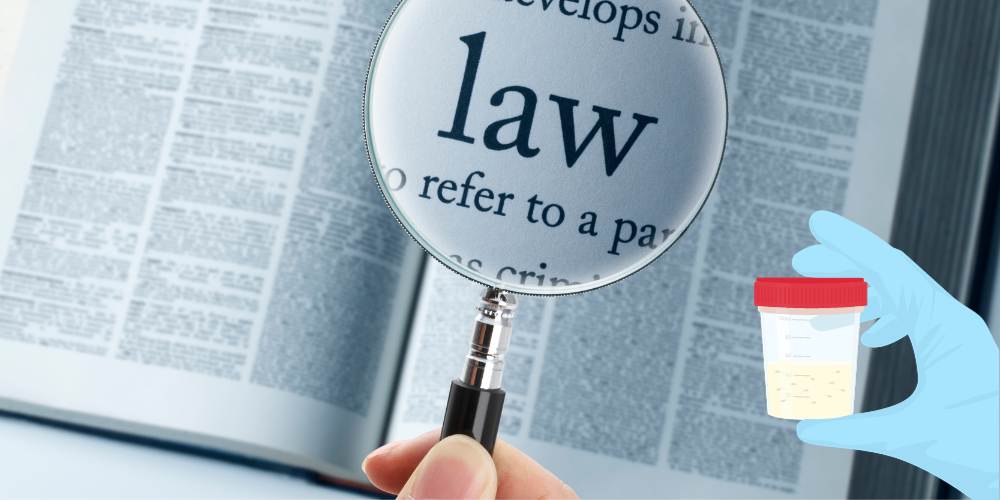 Although sperm donation is a legal process in some countries around the world, rules and regulations vary significantly from one country to another. Some countries have established legal frameworks, while others have no clear laws or guidelines. Sperm donation laws may include restricting the number of children a sperm donor can father, prohibiting the use of donor semen after the donor's death, or restricting the use of donor sperm for fertilization (IVF), which may be banned or restricted for example to heterosexual married couples. Donated sperm may be used for natural insemination, artificial insemination, or IVF. The Most Important Legal Aspects of Sperm Donation
Although sperm donation is a legal process in some countries around the world, rules and regulations vary significantly from one country to another. Some countries have established legal frameworks, while others have no clear laws or guidelines. Sperm donation laws may include restricting the number of children a sperm donor can father, prohibiting the use of donor semen after the donor's death, or restricting the use of donor sperm for fertilization (IVF), which may be banned or restricted for example to heterosexual married couples. Donated sperm may be used for natural insemination, artificial insemination, or IVF. The Most Important Legal Aspects of Sperm Donation
- Parental duties Generally, intended parents are considered the legal parents of the born children through ART methods. Sperm donors are not legal fathers, and therefore they have no responsibilities.
- Sperm donor anonymity In some countries, the anonymity of sperm donors is allowed, while in others, donors need to be identifiable when the child reaches a certain age (commonly 18 years old).
- Revealed donors Complications regarding legal responsibilities may arise if the sperm donor's identity is disclosed to the recipient. The donor could potentially hold parental responsibilities unless there is a legal agreement stating otherwise.
- Sperm donation limits There are countries in which law limits the number of offspring that a single donor may produce through ART methods. It will minimize the risk of related individuals breeding.
- Posthumous use In some countries, it is not legal to use a donor’s sperm after his death. There are other countries in which using donor sperm after donor death is not illegal but it needs prior consent. Note: If you're thinking about sperm donation, whether as a recipient or as a donor, we, at TebMedTourism, recommend that you seek advice from legal experts who are knowledgeable about the reproductive laws in your destination country before entering into any donation agreement.
Sperm Donation Laws for Donors
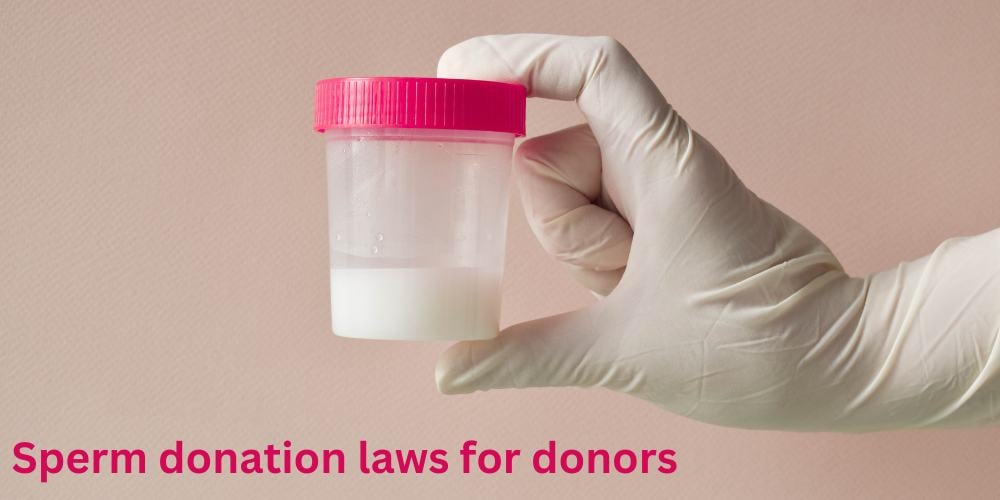 Laws regarding sperm donation for donors differ widely from one country to another. It depends on the jurisdiction and the conditions surrounding the donation in each country. Although there are some general rules for donors in many countries where sperm donation is done.
Laws regarding sperm donation for donors differ widely from one country to another. It depends on the jurisdiction and the conditions surrounding the donation in each country. Although there are some general rules for donors in many countries where sperm donation is done.
- Legal Parenthood Generally, a sperm donor does not have parental rights and responsibilities over a donor-conceived child. This is usually mentioned in legal documents which are signed before the donation. Note: In the case of known sperm donors, specific legal agreements are strongly advised to clarify issues of parental rights and responsibilities.
- Providing informed consent Donors must give informed consent, acknowledging that they understand the medical procedures involved, the implications of donating sperm, and how their donation may be used.
- Anonymity The regulations on whether sperm donors can maintain anonymity or are required to be identifiable to their offspring at a specific age differ between jurisdictions.
- Rigorous medical and psychological evaluations Usually, donors must undergo strict medical and psychological testing. These tests check whether diseases that could be passed on to the child exist or not.
- Genetic testing Genetic evaluations need to be done to identify any hereditary diseases that may be passed to the offspring. In some countries, disclosure of these results to the donor may be required.
- Financial compensation In some countries, sperm donation is only allowed in an altruistic way, and selling sperm is illegal.
- Sperm donation expenses Commonly, medical costs regarding sperm donation are covered by recipients or the clinic.
- Donation Limit Some jurisdictions limit the number of children that each donor may produce.
- Age limits Some countries have an age limit for donors, commonly between the ages of 18 and 40 years old.
- Posthumous Use There may be stipulations or restrictions concerning the use of a donor's sperm after his death.
Sperm Donation Laws for Recipients
 Many countries have restrictions regarding donor sperm recipients, while some jurisdictions have no limitations on who can receive it. For example, in Japan receiving donor sperm is limited to married heterosexual couples, in Austria it is restricted to married heterosexual or homosexual couples, while countries such as Sweden and Norway permit donations to married couples or those in cohabitation relationships. In France, single women and lesbian couples have been allowed to receive donor sperm since 2021. Although laws regarding sperm donation for recipients are different in different countries, there are some general rules for donor sperm recipients which are as follows:
Many countries have restrictions regarding donor sperm recipients, while some jurisdictions have no limitations on who can receive it. For example, in Japan receiving donor sperm is limited to married heterosexual couples, in Austria it is restricted to married heterosexual or homosexual couples, while countries such as Sweden and Norway permit donations to married couples or those in cohabitation relationships. In France, single women and lesbian couples have been allowed to receive donor sperm since 2021. Although laws regarding sperm donation for recipients are different in different countries, there are some general rules for donor sperm recipients which are as follows:
- Parental rights and responsibilities Generally, the couple or the woman who receives the donor sperm is the legal parent of the born child.
- Single and same-sex parents Sperm donation to single and same-sex parents is illegal in some countries.
- Contract with known donors In the case of using a known sperm donor, a legal agreement is strictly advised to specify all the responsibilities, rights, and roles of each party involved to establish the legal parentage of the child.
- Providing informed consent Donor sperm recipients must give informed consent like sperm donors for the process. This consent usually includes admission of potential complications and risks.
- Medical testing Most clinics need female recipients to undergo various medical tests for further ART technique usage.
- Costs and fees Donor sperm recipients need to pay for the receiving sperm and ART procedures.
- Legal Agreements with Clinics Most clinics have contracts that recipients need to sign.
- Future Contact with donor Based on the laws of some countries, children can contact their biological donors when they reach a certain age (usually 18). recipients should consider the implications that may happen.
- Sibling Donations Some recipients want to have some children from the same donor. Based on sperm donation laws and clinic policies, it may not be possible in some countries.
Countries Where Sperm Donation Is Legal
Sperm donation is a legal process in many countries worldwide, but the regulations surrounding it vary significantly from one country to another. While some countries have precise legal structures for sperm donation, while others have no clear laws. In the next part, the most popular countries where sperm donation is legal are listed.
Countries Where Sperm Donation Is Legal In 2023
Sperm donation is legal in the following countries:
- Iran
- United States
- Canada
- United Kingdom
- Switzerland
- Sweden
- Spain
- Portugal
- Norway
- New Zealand
- Netherlands
- Japan
- Italy
- Hong Kong
- Germany
- France
- Finland
- Denmark
- Cyprus
- Bulgaria
- Belgium
- Austria
- Australia
- Israel
- Hungary
- Greece
- Slovenia
- India
- Colombia
- Korea
- Latvia
- Russia
- Taiwan
- Thailand
- South Africa
- Argentina
- Brazil
- Chile
- China
- Singapore
- Mexico
- Lithuania
- Ireland
- Vietnam
- Poland
Countries Where Sperm Donation Is Illegal in 2023
In some countries, sperm donation is illegal due to religious or ethical reasons. For example, in many predominantly Muslim countries (Sunni), sperm donation is prohibited under Islamic law because it is considered a form of adultery. Some of the mentioned Muslim countries are as follows:
- Saudi Arabia
- United Arab Emirates
- Pakistan
- Afghanistan
- Egypt
- Turkey
Sperm Donation Laws in the USA
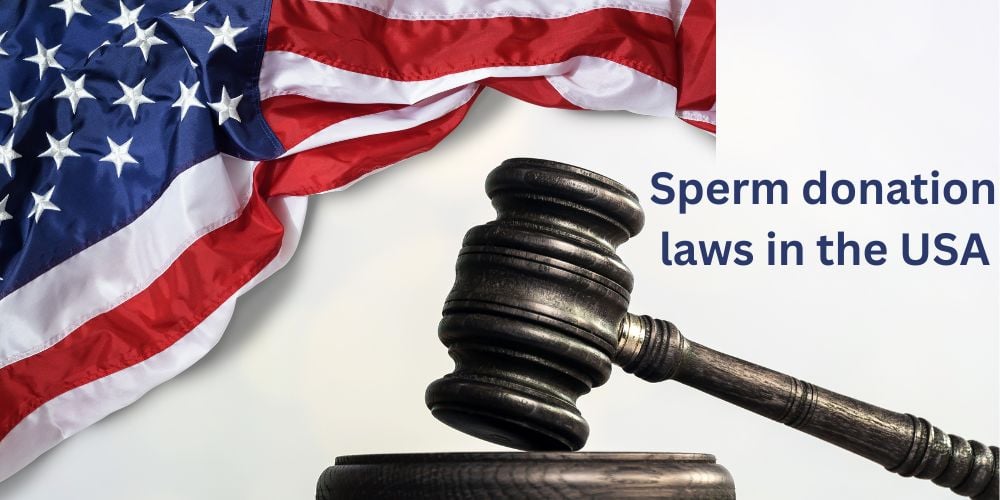 Generally, in the United States of America, there are no federal or state regulations governing sperm donation. However, the American Society for Reproductive Medicine (ASRM) and some other related groups such as the Food and Drug Administration (FDA), and the American Association of Tissue Banks (AATB) have provided recommendations and guidelines. the majority of the states follow the guidelines provided by the mentioned organization. For example, The ASRM guidelines limited each sperm donor to have 25 live births per population area of 850,000. It needs to be noted that it is not enforced by law, therefore these numbers are not officially tracked and real birth numbers related to some donors exceed that limit. Some sperm banks have a limit on the number of families that can receive donations from a single donor. For instance, the sperm bank of California limits it to ten families per donor, while the Rainbow Flag sperm bank limits the number of donor children to six per donor with different women. The FDA usually regulates donor testing for infectious and contagious diseases for safety reasons in advance. Sperm banks need to obey certain labeling, record-keeping, and reporting requirements. Testing and disclosure requirements for other genetic disorders are left to state medical boards and legislatures. Federal law doesn't explicitly require sperm and egg banks to perform testing for a range of genetic disorders. AATB regulates sperm banks at the National level. At the state level, sperm banks are regulated by the state department in each state. Regulatory agencies assess compliance with client and donor rights. In conclusion, in the absence of clear regulations regarding sperm donation in the USA, both intended parents and sperm donors are advised to seek legal advice for drawing up contracts about paternity rights, financial responsibilities, the chance of contacting in the future, etc.
Generally, in the United States of America, there are no federal or state regulations governing sperm donation. However, the American Society for Reproductive Medicine (ASRM) and some other related groups such as the Food and Drug Administration (FDA), and the American Association of Tissue Banks (AATB) have provided recommendations and guidelines. the majority of the states follow the guidelines provided by the mentioned organization. For example, The ASRM guidelines limited each sperm donor to have 25 live births per population area of 850,000. It needs to be noted that it is not enforced by law, therefore these numbers are not officially tracked and real birth numbers related to some donors exceed that limit. Some sperm banks have a limit on the number of families that can receive donations from a single donor. For instance, the sperm bank of California limits it to ten families per donor, while the Rainbow Flag sperm bank limits the number of donor children to six per donor with different women. The FDA usually regulates donor testing for infectious and contagious diseases for safety reasons in advance. Sperm banks need to obey certain labeling, record-keeping, and reporting requirements. Testing and disclosure requirements for other genetic disorders are left to state medical boards and legislatures. Federal law doesn't explicitly require sperm and egg banks to perform testing for a range of genetic disorders. AATB regulates sperm banks at the National level. At the state level, sperm banks are regulated by the state department in each state. Regulatory agencies assess compliance with client and donor rights. In conclusion, in the absence of clear regulations regarding sperm donation in the USA, both intended parents and sperm donors are advised to seek legal advice for drawing up contracts about paternity rights, financial responsibilities, the chance of contacting in the future, etc.
Sperm Donation Laws by State
- Anonymity of donors In most states of the USA, sperm donors can remain anonymous. however, it’s not a full conversion even in these states. On the other hand, there are states including California, Connecticut, Rhode Island, and Washington DC where sperm donor identity will not be anonymous. Some sperm banks offer an identity-release program where donors agree to let their biological offspring know their identity once they become 18 or 21 years old.
- Parental rights Generally, if a sperm donor donates through a licensed sperm bank and follows state regulations, they forfeit all parental rights and obligations. This implies that they have no legal responsibilities or obligations towards any child conceived from their donation, and they also have no right to visit or have custody of the child.
- Posthumous use of sperm The United States lacks laws that directly address donor sperm use after the donor's death.
- Compensation Sperm banks compensate donors for their time and inconvenience. Payment varies by region and should not be the primary motivation for donation, according to ASRM guidelines.
- Rights of offspring The rights of donor-conceived offspring vary depending on the state. In certain states, the children don’t have the right to know their donors. Some other states have established or are considering registration that allows donors to become aware of their donors' identity after a certain age (18 or 21).
- Married couples and sperm donation In most states, if a married woman becomes pregnant through sperm donation, her husband is legally recognized as the father of the child.
- Same-sex couples or single parents In the case of same-sex couples using a donor sperm to have a child, Law is more complicated and it depends on the biological relationship. Different states might have different legislation. Some states express the rights of lesbian couples or single parents.
Known Sperm Donor Laws by State
the legal landscape in the case of a known sperm donor can be more complicated. Both recipients and donors need to consult with an attorney and sign a legal agreement that completely defines the rights and responsibilities of each party. Known donors may be responsible for child support without clear legal documentation. Generally, in the USA when artificial insemination is used to conceive a child, known sperm donors are not legal fathers, so if the sperm donor wants to have parenting rights, there should be a signed formal agreement prior.
UK Sperm Donation Laws
The Human Fertilization and Embryology Act set up the Human Fertilization and Embryology Authority (HFEA) in 1990. The HFEA is responsible for licensing, monitoring, and inspecting fertility clinics to ensure high-quality care for patients and all individuals born through fertility treatment.
- Donor anonymity In 2005, the UK government removed the right to anonymity for sperm donors. As a result, any child who was conceived through donation has the legal right to access identifying information about their donor once they reach the age of 18. This information can include the donor's name and their last known address.
- Parental rights and responsibilities If sperm donation is done through a licensed clinic in the UK, the donor does not have any legal rights or responsibilities for any child conceived from his sperm. However, in the case of private sperm donation (i.e., not through a licensed clinic) parental rights and responsibilities and rights can be complex and the donor might be considered the legal father.
- Donation limit A sperm donor can donate to up to 10 different families with no limit on the number of children in each family.
- Age limit Although there's no strict legal age limit for sperm donors in the UK, the age range between 18 and 41 is advised. This recommendation is for ensuring the health and quality of the sperm.
- Screening Sperm donors need to undergo thorough medical and genetic tests to ensure that they don't carry any transmittable diseases or conditions. Donors also undergo a quarantine period, usually for six months, after which their samples are re-tested for diseases like HIV before being used in treatments.
- Payment In the UK, it is illegal to pay sperm donors more than their reasonable expenses.
- Storage The new law (1 July 2022) allows patients to extend storage up to 55 years by renewing their consent every 10 years. It's essential to note that laws and regulations can change, and it's always a good idea to consult up-to-date sources or legal professionals for the latest information.
Sperm Donation Laws in India 2023
Sperm donation is legal in India and its regulations and guidelines were established by the Indian Council of Medical Research (ICMR). These guidelines define the medical and ethical standards that fertility clinics and sperm banks need to obey. There is no direct legal ban on foreigners receiving donor sperm in India. However, due to the constantly evolving regulatory landscape and the policies of individual clinics, accessing and availing these services might not be as straightforward for foreign nationals. Besides surrogacy which may be needed for some infertile couples is prohibited for foreigners.
- Anonymity The identity of the sperm donor and the recipient should be kept anonymous without proper authorization.
- Donor Eligibility Eligibility criteria for sperm donors include age restrictions (generally between 21 and 45 years), absence of any known genetic disorders, physical and mental health requirements, etc. Potential donors usually need to undergo thorough different screenings before being considered eligible.
- Documentation Clinics should keep accurate records related to sperm donation.
- Financial Aspects The ICMR regulations only approve altruistic donation and forbid the commercialization of sperm donation, emphasizing that it should be an altruistic act rather than a profit-driven transaction. Reasonable monetary compensation for the donor's expenses is allowed. The financial aspects may vary depending on individual clinic policies and legal interpretations.
- Informed Consent The donor and recipient(s) must sign two different informed consents. The purpose is to let them know the nature of the procedure, the potential implications and risks, the confidentiality measures in place, etc.
Is Sperm Donation Legal In the UAE?
IVF–Sperm Donation is Prohibited by law in UAE which is an Islamic country. Under its New IVF Law, sperm donation, egg donation, surrogacy, and embryonic banks are all illegal.
Sperm Donation Laws in Iran
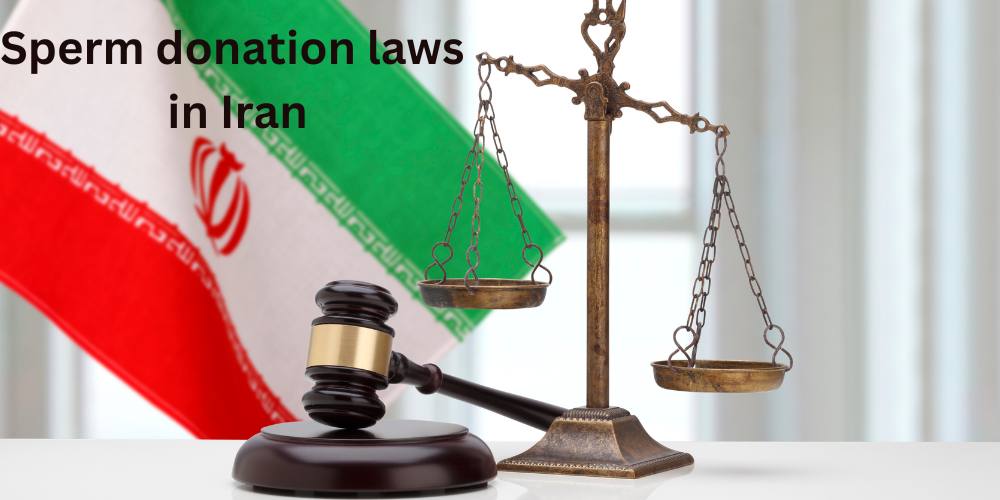 In Iran, sperm donation is legal for heterosexual married couples. It was regulated by the Ministry of Health and Medical Education. All sperm banks need to follow specific standards to ensure the health and safety of both donors and recipients. undergoing sperm donation in Iran has several advantages including affordable costs, skilled doctors and staff, very high success rates, the anonymity of donors, the availability of surrogacy, PGD (preimplantation genetic screening), PGS (preimplantation genetic screening), etc. Note: In contrast to some countries like the UK and Spain, In Iran Non-ID Release donors system is accepted. Note: Iran is the only Islamic country in which sperm donation and other ART techniques are legal and legitimate. Note: In Iran, there are various phenotypes, therefore recipients can choose their donor based on their desired features.
In Iran, sperm donation is legal for heterosexual married couples. It was regulated by the Ministry of Health and Medical Education. All sperm banks need to follow specific standards to ensure the health and safety of both donors and recipients. undergoing sperm donation in Iran has several advantages including affordable costs, skilled doctors and staff, very high success rates, the anonymity of donors, the availability of surrogacy, PGD (preimplantation genetic screening), PGS (preimplantation genetic screening), etc. Note: In contrast to some countries like the UK and Spain, In Iran Non-ID Release donors system is accepted. Note: Iran is the only Islamic country in which sperm donation and other ART techniques are legal and legitimate. Note: In Iran, there are various phenotypes, therefore recipients can choose their donor based on their desired features.
Sperm Donation in Iran Through TebMedTourism
TebMedTourism is a medical tourism facilitator that offers different types of infertility treatment, such as sperm donation to international married couples in Iran. All of these services are supported by legal and religious jurisdiction in Iran. The benefits of undergoing sperm donation + one of the ART techniques through TebMedTourism include low costs in comparison to other countries (because of Iran's low currency price), skilled specialists, the best fertility centers, high success rates, and anonymity of donors who have been screened before being accepted as donors. We also provide the best non-medical services in Iran such as accommodation and transportation to make sure that our customers' stay is very convenient in Iran. If you are struggling with infertility issues, feel free to send us a message via WhatsApp at +998120985010 (24/7). Our experts and specialists are ready to answer your questions.  Frequently Asked Questions:
Frequently Asked Questions:
- Is sperm donation allowed in Iran? Yes. Sperm donation is legal for heterosexual married couples.
- Can our child contact the sperm donor later? It depends on the country in which you undergo this process.
- Can international students donate sperm in the USA? Generally, there are no federal laws forbidding international students from donating sperm in the USA. Sperm donation in the USA is typically regulated by individual sperm banks or cryobanks, which follow guidelines established by organizations such as the ASRM.
- Is sperm donation legal in the Netherlands? Yes. Sperm donation is legal in the Netherlands.
- Can I send my sperm to another country? Donor sperm can be sent to countries all around the world by carriers such as ships and airplanes. The sperm sample needs to be frozen in a tube first and then transported in a container that is designed for transporting biological materials.
- Why is sperm donation illegal in Canada? It is not correct. Sperm donation is legal in Canada, however, there are some restrictions. For example, purchasing donor sperm is illegal in Canada.
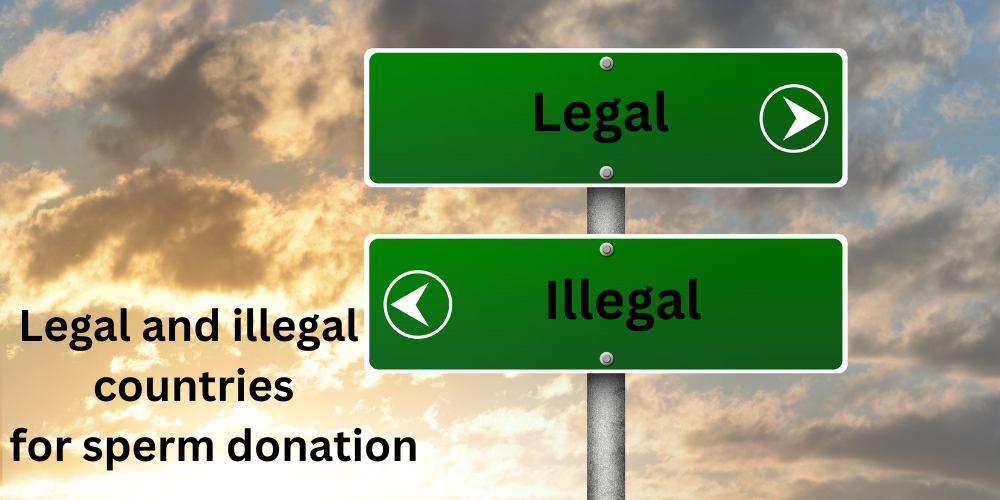
 Although sperm donation is a legal process in some countries around the world, rules and regulations vary significantly from one country to another. Some countries have established legal frameworks, while others have no clear laws or guidelines. Sperm donation laws may include restricting the number of children a sperm donor can father, prohibiting the use of donor semen after the donor's death, or restricting the use of donor sperm for fertilization (IVF), which may be banned or restricted for example to heterosexual married couples. Donated sperm may be used for natural insemination, artificial insemination, or IVF. The Most Important Legal Aspects of Sperm Donation
Although sperm donation is a legal process in some countries around the world, rules and regulations vary significantly from one country to another. Some countries have established legal frameworks, while others have no clear laws or guidelines. Sperm donation laws may include restricting the number of children a sperm donor can father, prohibiting the use of donor semen after the donor's death, or restricting the use of donor sperm for fertilization (IVF), which may be banned or restricted for example to heterosexual married couples. Donated sperm may be used for natural insemination, artificial insemination, or IVF. The Most Important Legal Aspects of Sperm Donation Laws regarding sperm donation for donors differ widely from one country to another. It depends on the jurisdiction and the conditions surrounding the donation in each country. Although there are some general rules for donors in many countries where sperm donation is done.
Laws regarding sperm donation for donors differ widely from one country to another. It depends on the jurisdiction and the conditions surrounding the donation in each country. Although there are some general rules for donors in many countries where sperm donation is done. Many countries have restrictions regarding donor sperm recipients, while some jurisdictions have no limitations on who can receive it. For example, in Japan receiving donor sperm is limited to married heterosexual couples, in Austria it is restricted to married heterosexual or homosexual couples, while countries such as Sweden and Norway permit donations to married couples or those in cohabitation relationships. In France, single women and lesbian couples have been allowed to receive donor sperm since 2021. Although laws regarding sperm donation for recipients are different in different countries, there are some general rules for donor sperm recipients which are as follows:
Many countries have restrictions regarding donor sperm recipients, while some jurisdictions have no limitations on who can receive it. For example, in Japan receiving donor sperm is limited to married heterosexual couples, in Austria it is restricted to married heterosexual or homosexual couples, while countries such as Sweden and Norway permit donations to married couples or those in cohabitation relationships. In France, single women and lesbian couples have been allowed to receive donor sperm since 2021. Although laws regarding sperm donation for recipients are different in different countries, there are some general rules for donor sperm recipients which are as follows: Generally, in the United States of America, there are no federal or state regulations governing sperm donation. However, the American Society for Reproductive Medicine (ASRM) and some other related groups such as the Food and Drug Administration (FDA), and the American Association of Tissue Banks (AATB) have provided recommendations and guidelines. the majority of the states follow the guidelines provided by the mentioned organization. For example, The ASRM guidelines limited each sperm donor to have 25 live births per population area of 850,000. It needs to be noted that it is not enforced by law, therefore these numbers are not officially tracked and real birth numbers related to some donors exceed that limit. Some sperm banks have a limit on the number of families that can receive donations from a single donor. For instance, the sperm bank of California limits it to ten families per donor, while the Rainbow Flag sperm bank limits the number of donor children to six per donor with different women. The FDA usually regulates donor testing for infectious and contagious diseases for safety reasons in advance. Sperm banks need to obey certain labeling, record-keeping, and reporting requirements. Testing and disclosure requirements for other genetic disorders are left to state medical boards and legislatures. Federal law doesn't explicitly require sperm and egg banks to perform testing for a range of genetic disorders. AATB regulates sperm banks at the National level. At the state level, sperm banks are regulated by the state department in each state. Regulatory agencies assess compliance with client and donor rights. In conclusion, in the absence of clear regulations regarding sperm donation in the USA, both intended parents and sperm donors are advised to seek legal advice for drawing up contracts about paternity rights, financial responsibilities, the chance of contacting in the future, etc.
Generally, in the United States of America, there are no federal or state regulations governing sperm donation. However, the American Society for Reproductive Medicine (ASRM) and some other related groups such as the Food and Drug Administration (FDA), and the American Association of Tissue Banks (AATB) have provided recommendations and guidelines. the majority of the states follow the guidelines provided by the mentioned organization. For example, The ASRM guidelines limited each sperm donor to have 25 live births per population area of 850,000. It needs to be noted that it is not enforced by law, therefore these numbers are not officially tracked and real birth numbers related to some donors exceed that limit. Some sperm banks have a limit on the number of families that can receive donations from a single donor. For instance, the sperm bank of California limits it to ten families per donor, while the Rainbow Flag sperm bank limits the number of donor children to six per donor with different women. The FDA usually regulates donor testing for infectious and contagious diseases for safety reasons in advance. Sperm banks need to obey certain labeling, record-keeping, and reporting requirements. Testing and disclosure requirements for other genetic disorders are left to state medical boards and legislatures. Federal law doesn't explicitly require sperm and egg banks to perform testing for a range of genetic disorders. AATB regulates sperm banks at the National level. At the state level, sperm banks are regulated by the state department in each state. Regulatory agencies assess compliance with client and donor rights. In conclusion, in the absence of clear regulations regarding sperm donation in the USA, both intended parents and sperm donors are advised to seek legal advice for drawing up contracts about paternity rights, financial responsibilities, the chance of contacting in the future, etc. In Iran, sperm donation is legal for heterosexual married couples. It was regulated by the Ministry of Health and Medical Education. All sperm banks need to follow specific standards to ensure the health and safety of both donors and recipients. undergoing sperm donation in Iran has several advantages including affordable costs, skilled doctors and staff, very high success rates, the anonymity of donors, the availability of surrogacy, PGD (preimplantation genetic screening), PGS (preimplantation genetic screening), etc. Note: In contrast to some countries like the UK and Spain, In Iran Non-ID Release donors system is accepted. Note: Iran is the only Islamic country in which sperm donation and other ART techniques are legal and legitimate. Note: In Iran, there are various phenotypes, therefore recipients can choose their donor based on their desired features.
In Iran, sperm donation is legal for heterosexual married couples. It was regulated by the Ministry of Health and Medical Education. All sperm banks need to follow specific standards to ensure the health and safety of both donors and recipients. undergoing sperm donation in Iran has several advantages including affordable costs, skilled doctors and staff, very high success rates, the anonymity of donors, the availability of surrogacy, PGD (preimplantation genetic screening), PGS (preimplantation genetic screening), etc. Note: In contrast to some countries like the UK and Spain, In Iran Non-ID Release donors system is accepted. Note: Iran is the only Islamic country in which sperm donation and other ART techniques are legal and legitimate. Note: In Iran, there are various phenotypes, therefore recipients can choose their donor based on their desired features. Frequently Asked Questions:
Frequently Asked Questions:
Comments & Questions